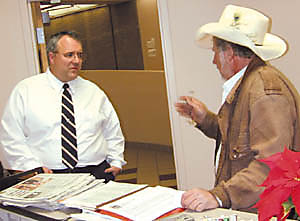When Reindeer Lodge owner Gary Schmidt comes into an office in an agitated state, there
is no doubt that Gary Schmidt is in an agitated state. Schmidt, who during the last few
years has become a public-records activist to be reckoned with, had just come to the
RN&R offices from Reno City Hall after being stymied in his pursuit of some public
documents. He was agitated.
Regular readers will recognize Schmidt’s name. He’s the man who sued Washoe
County over county employees’ refusal to give him documents to which he was legally
entitled. Schmidt won in Washoe District Court and again before the Nevada Supreme Court.
In Nevada, public-document requests are covered under NRS 239. That law basically says
that, unless there is a specific exception listed in state law, a record generated by a
government employee is a public record. For sensitive documents, like the makes and models
of police vehicles, there is a balancing test, which requires officials to perform a
cost-benefit analysis of the public’s right to know.
The wealthy and litigious business owner was researching property on Fourth Street.
“I’m looking at Fourth Street as a potential strip entertainment
center,” he said. “I think it’s an appropriate place for a sports center or
an ice hockey rink.”
He says he made some innocuous requests at the business license office but was
unilaterally denied. To make a long story short, he finally requested a copy of one of
those must-be-displayed-in-a-prominent-place business licenses--the one that belongs to
Harrah’s Casino. It is, Schmidt maintains, possibly the most public public document
in the city of Reno’s care.
Schmidt, not one to take no for an answer, ended up at the City Attorney’s Office
asking for help getting the records, but he received little satisfaction.
That’s when he came to the News & Review offices, in hopes of returning to
City Hall with a reporter to document his attempts to get public records from the city of
Reno. He went back with staff photographer David Robert.
“I’m a property and public-record rights advocate,” he said. “They
go hand in hand. One of the ways government usurps your private-property rights is to deny
your public-records requests. I’ve learned over the years, you’d better do some
due diligence, and you’d better stay up on the issues [which requires public-record
access].”
The pair said they were met by city officials who required identification of the
photojournalist and had the businessman followed by security guards.
He left written requests for public documents with various offices and left without
serious incident or the records he claims he was entitled to.
Three days later, Schmidt filed suit in the Washoe District Court against the city of
Reno in regard to denial of public documents.
The city of Reno’s public information officer, Steve Frady, claimed little
knowledge of the incident, but he did suggest a call to City Attorney Patricia
Lynch’s office. He also hinted that she might be restrained in her comments because
of the lawsuit. Assistant City Attorney Randall Edwards did return a call, but reached
voice mail.
“I don’t get it,” Schmidt said. “Which part of the words
‘public servant’ don’t they understand? They think they are the public
masters. They’re supposed to help us out, not hinder or obstruct us.”

